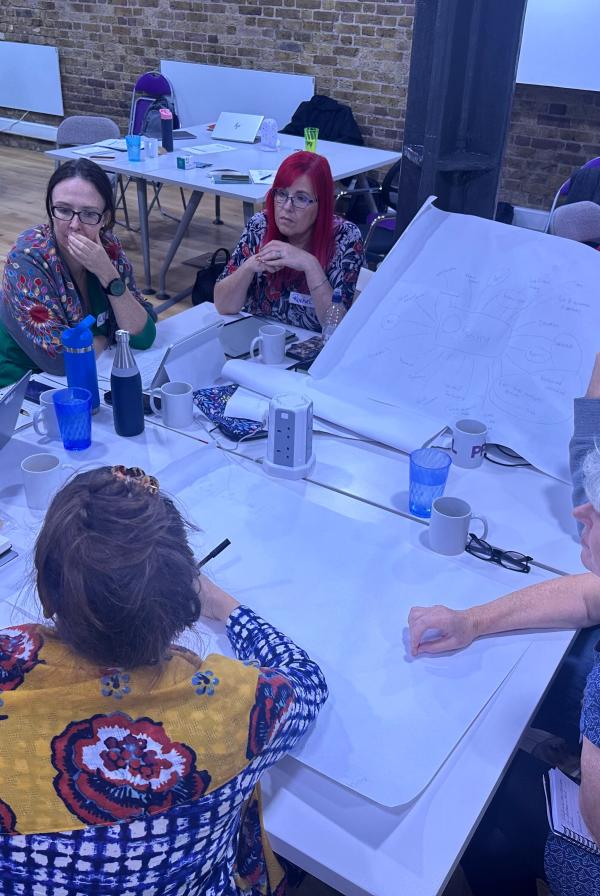The South-East Neighbourhood Health Accelerator Programme
The South-East Neighbourhood Health Accelerator Programme is designed to strengthen local leadership and collaboration to improve health equity and integration at neighbourhood level. Over eight months, cross-sector teams will come together to build trusted relationships, using population health insights, they will co-design solutions to real-world challenges. Through immersive simulation, action learning, and digital innovation, participants will develop the collective leadership and practical tools needed to deliver joined-up, person-centred neighbourhood care.
The programme aims to equip neighbourhood teams to navigate complexity, reduce inequalities, and accelerate the delivery of sustainable improvements that make a tangible difference in their communities.
Programme overview
- Purpose: Strengthen neighbourhood leadership and collaboration to improve health equity and integration. Building trusted relationships, reducing inequalities, and delivering joined-up, person-centred care.
- Format: 8-month programme, one day per month (Sept 2025 – April 2026).
- Participants: Six cross-sector neighbourhood teams (6–8 members each) tackling locally relevant challenges.
- Approach: Supporting initiative development, Immersive simulation, action learning, digital innovation, and population health insights.
- Impact: Equip teams to navigate complexity, accelerate neighbourhood projects, and drive sustainable improvement projects and build effective working cross-sector relationships.
The SE Neighbourhood Health Accelerator programme has been built on six evidence-based design principles that directly support the challenges and opportunities faced by neighbourhood teams across the South-East. These principles ensure that the programme is not only relevant, but also practical, applied, and impactful for participants working in complex, real-world settings.
- Collective & Distributed Leadership – leadership is shared across roles, sectors, and lived experiences.
- Systems Thinking & Complexity – embrace uncertainty, interdependencies, and no single “right” answer.
- Equity, Co-Design & Co-Delivery – ensure lived experience and inclusion are prime to tackle inequalities.
- Psychological Safety & High-Trust Challenge – create safe yet stretching environments for learning and collaboration.
- Experiential & Collaborative Learning – learning through real-world experience, reflection, and group dynamics.
- Skills-Based & Applied Learning – focus on practical behaviours, tools, and how to lead in practice.
By combining collective leadership, systems thinking, equity, safety, experiential learning, and practical skill-building, the programme prepares neighbourhood teams to navigate complexity and deliver meaningful, equitable change in their communities.
Module 2 highlights: becoming data-driven, behaviour-aware, and neighbourhood ready
We have marked another step forward for our NHSE South-East Neighbourhood Health Accelerator. Module 2 brought our neighbourhood teams together for a day of deeper learning, practical tools, and honest reflection about what it really takes to drive change at neighbourhood level.
From understanding problems to designing measurable impact
A central focus of Module 2 was the shift toward becoming truly data-driven. Teams explored how Population Health Management (PHM) can unlock the real drivers behind local challenges and highlight the data sources that matter most. With this foundation, teams began shaping early metrics of impact for their neighbourhood projects, strengthening the bridge between problem-definition and meaningful, measurable action.
Dr Saloni Zaveri delivered an expertly tailored PHM session with Public health data trends across the south east, and Susan Koeffler-Sluijter from the Local Knowledge Intelligence Service (LKIS) brought data to life with clarity, warmth, and humour. Their guidance helped teams translate data and trends into focused, SMART challenge statements that will underpin their next stages of action planning.
Data matters — but behaviour shapes change
Alongside the analytical work, we turned our attention to the beliefs, behaviours, and human factors that determine whether cross-sector work actually succeeds. Stories, lived experience, and credible voices remain central to building shared understanding — and the teams challenge statements were a powerful reminder of the importance of hearing each other’s perspectives.
Neighbourhood working is inherently complex. It requires professionals from different organisations, cultures, and priorities to design solutions together. This is why leadership behaviours are just as essential as technical planning. Recent commentary in the Health Service Journal underscores this: action plans and policy shifts alone cannot deliver change without behaviour change and relational collaboration at their core.
This ethos sits at the heart of this programme.
Teams stepping into the stretch zone
What stood out most throughout the day was the willingness of teams to step into their stretch zone — questioning assumptions, challenging one another, and leaning into the discomfort that often accompanies innovation. Together, we explored the leadership behaviours needed to build trust, work across boundaries, and co-design evidence-based, locally grounded solutions.
Core Commitments
Our core commitments to the programme run throughout every module and activity ensuring that lived experience ‘resident’ voices are actively listened to and meaningfully involved at every stage of neighbourhood working, from project design to co-delivery and evaluation:
- Embed lived experience ‘residents voice as equal partners in design, delivery, and evaluation of projects.
- Use storytelling, case studies, and lived experience in every module to ground learning in real-world perspectives.
- Encourage teams to create feedback loops with their communities see how their input has shaped decisions.
- Train participants in co-production and facilitation skills to work confidently with lived experience voices.
How we will deliver:
- Facilitate group discussions in Module 1 to co-create a shared terminology of terms for neighbourhood working.
- Encourage teams to reflect on language choices during exercises, recognising how words can empower or exclude.
- Provide practical tools and prompts for inclusive communication (e.g. language guides, reflective checklists).
- Continuously revisit terminology across modules to ensure clarity, consistency, and inclusivity as projects develop.
These commitments ensure the programme stays grounded in people’s real experiences and builds common understanding across diverse partners.


